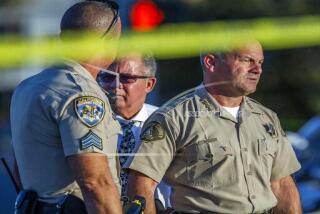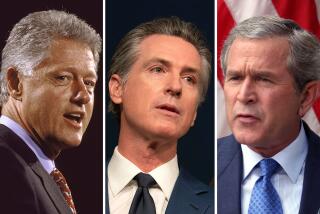Buchanan Takes Aim at Wilson : GOP: Conservative says he will seek to repudiate governor and party moderates in California. He likens primary to battle of Antietam.
BOSTON — Patrick J. Buchanan said Sunday that he intends to turn California’s Republican primary campaign into a prolonged and hostile fight aimed in part at repudiating the state’s moderate GOP Gov. Pete Wilson.
He charged that California conservatives “have had their noses rubbed in the dirt” by Wilson and President Bush and said that the California race would transform the June 2nd primary day itself into “the Antietam of the Republican Party.”
The unapologetic reference to the bloodiest battle of the Civil War underscored what Buchanan acknowledged is a determination to use his candidacy, if nothing else, to squelch the forces of Republican moderation.
“You can win as much by losing as by victory,” Buchanan said in an interview aboard his campaign plane. Making clear his intention to take his fight to the Republican convention in Houston, he said that--even if he is unsuccessful in his quest for the nomination--he might seek concessions in the party’s rules and platform.
Bill Livingstone, Wilson’s press secretary, answered Buchanan in kind: “It’s not Antietam but Appomattox where Buchanan is headed after his bruising defeat in the South,” he said, referring to the place where Confederate Gen. Robert E. Lee surrendered. “California is Bush country, which was affirmed last weekend at the state Republican Convention, where he received an overwhelming vote of support.”
Speaking on the day after he lost the South Carolina primary to the President, 67% to 26%, Buchanan continued to stress the hope that he will win a primary victory soon that might drive the Bush forces to collapse.
But he acknowledged that he is likely to fall further behind Bush in Tuesday’s flurry of eight Republican primaries, and he left little doubt in the interview that he has begun increasingly to regard his candidacy as a crusade.
“Conservatives are romantics,” he said. “We don’t mind lost causes. We love ‘em.”
His call to arms in California marked his most explicit threat to transform the race into a fractious fight. And coming from a candidate who considers himself a rebel, his mention of Antietam carries deeper meaning. Union forces claimed a victory in that battle in September, 1862, but at a cost of 2,000 lives on a day in which 2,700 of the South’s soldiers died and there were another 19,000 wounded on both sides.
Buchanan appears so preoccupied with the prospect of such a showdown that he began to sound a California rallying cry this week in settings as far-removed as Mississippi’s Gulf Coast. “They’re waiting for someone to stand up to George Bush-, Pete Wilson-style Republicanism,” he proclaimed Saturday night in New Orleans.
Even if Bush’s nomination were already assured, an aggressive Buchanan campaign in California could give powerful voice to a dissident Republican cause already championed by U.S. Senate candidates William E. Dannemeyer and Bruce Herschensohn.
Likening this year’s June primary to the 1964 Republican showdown in California between conservative Barry Goldwater and moderate Nelson Rockefeller, Buchanan said that his challenge to Bush would “give voice” to the state GOP’s “unrepresented” Goldwater wing.
“We’re going to try to champion its cause,” he said at a news conference in Warwick, R.I.
Buchanan said that his animosity toward Wilson was fueled by the governor’s decision to raise taxes and by his “contemptuous attitude” toward conservatives. But it seemed likely that in targeting Wilson he also is seeking to launch a preemptive strike against a potential rival for the 1996 Republican nomination.
A recurring theme of Buchanan’s 13-week-old campaign has been blunt criticism of fellow conservatives regarded as possible candidates, including Vice President Dan Quayle, Housing Secretary Jack Kemp and William J. Bennett, formerly head of the Administration’s war on drugs. Without acknowledging his motivation, Buchanan said Sunday that he intends to include Wilson as a subject of his scorn.
“They all belong in the same bag,” he said in the interview. “They’re all Bush men.” Later in the day, he cited Wilson’s stand on social issues and support for abortion rights to say that he could not envision Wilson as a GOP presidential nominee “unless the party changes its character entirely.
“And if it moves that far by 1996,” he added, “let’s see where we all are.”
Buchanan campaigned before small crowds in Massachusetts and Rhode Island in advance of primary elections Tuesday in hopes that his insurgency could strike a chord among what campaign officials regard as increasingly conservative Republican electorates in those states.
He encountered hecklers charging that he was anti-Semitic and homophobic, however, and a poll published in Sunday’s editions of the Boston Globe showed Bush running ahead of Buchanan by a 69-17 margin. The challenger is scheduled to fly back to Louisiana and Mississippi today for a final pre-Super Tuesday swing in the states where his prospects appear strongest.
As part of an increasingly nativist appeal to voters there, Buchanan on Saturday sharpened his America first message before supporters in Gulfport, proclaiming that Japan was no more than a “pile of rocks.”
“Those little dinky countries can’t beat us,” he said in a tribute to the nation’s resources. “You know, you take Germany, East and West Germany, put ‘em together, that’s about the size of Oregon and Washington. It’s a little dinky country.
“You take Japan,” he continued. “It’s a pile of rocks over there. You could put the whole thing in California.”
But campaign officials conceded that a victory in any of the eight states holding Republican primaries Tuesday appears unlikely and that Buchanan has already set his sights on coming campaigns in Michigan, North Carolina and California.
At a news conference in Boston, Buchanan said that he thinks his bid for the nomination still has “a chance. If we get one big victory, then the whole thing can collapse.” In the interview, however, he acknowledged that he knows of no way to overcome what has been a central weakness of his campaign: its inability to attract support from more than one-fourth of Republican women voters.
“If we just got a normal break with women,” he said wistfully, “we would really be doing well.”
Admitting that it will become all but impossible to oust Bush unless he can win somewhere soon, Buchanan also hinted at a bargain that could bring about a more cordial Republican race.
After telling an interviewer on CBS’ “Face the Nation” that he would be willing to support the President in the general election “as long as the fight stays at a fair level,” he urged in Boston that Bush order his lieutenants to “cease and desist” their attacks against him.
Aboard his plane, Buchanan said that he is determined to carry his campaign through the Republican convention in mid-August but that he is uncertain--should he fail to win the nomination--what he would ask of Bush.
Acknowledging that his posture bears “some parallels” to that assumed by the Rev. Jesse Jackson in the Democratic Party four years ago, he said: “We’ll all sit down and we’ll talk to the people who are with us and ask what they think we ought to do.”
But he said that he regards himself “as an instrument of this cause” and said that he intends at the convention to “articulate the things that I know and care about.”
* RELATED STORY: F1
More to Read
Get the L.A. Times Politics newsletter
Deeply reported insights into legislation, politics and policy from Sacramento, Washington and beyond. In your inbox three times per week.
You may occasionally receive promotional content from the Los Angeles Times.










